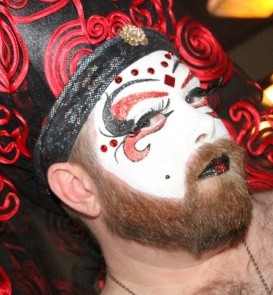[Crystal Blanton is one of our talented monthly columnists. If you like her work and want to support her writing here at The Wild Hunt, please consider donating to our fall funding drive and sharing our IndieGoGo link. It is your continued support that had made it possible for us to feature Crystal and her insightful column, Culture and Community, each month. Will you donate now? Thank you.]
Facebook’s “real name” policy has caused a recent storm of responses from many social media consumers, increasing the number of people who have started the process in taking their social media loyalty someplace else. The resulting controversy and consumer response to the deactivation of accounts under this policy have caused many people to question staying on a social media platform that does not appear to care about the needs of its consumers.
As The Wild Hunt reported on Wednesday, Facebook recently issued an apology, specifically to the LGTBQ community, about the way that the policy was enforced this past month. While Facebook said that the policy will remain in effect, they also said that they are re-evaluating the way that the name policy is enforced because it disproportionately affects those from the drag queen, transgender and LGBTQ communities.
![[Photo Credit: Emily Rose / Tako Fibers, Flickr]](https://wildhunt.org/wp-content/uploads/2014/10/3511330328_8ca4abc6a5_z-500x335.jpg)
[Photo Credit: Emily Rose / Tako Fibers, Flickr]
Pagans are among some of the marginalized groups that utilize alternative names on social media. Sometimes this is a protection mechanism from judgment that would affect their ability to thrive in their physical community and sometimes this is a spiritual choice. The change in the name policy and the enforcement of this policy could have a big impact on the Pagan community and others.
The responses within the Pagan community to Facebook’s “real name” policy and the subsequent apology has been quite varied. It has ranged from people completely leaving Facebook and transitioning to other social media outlets, like Ello or Sgrouples, to being resistant to a social media switch.
Author and Activist T Thorn Coyle has been one of the Pagans speaking out and actively transitioning her personal social media needs away from Facebook. She said:
T. Thorn Coyle
Facebook has never been a good fit for me. While I appreciate the conversations I have with people on my public page, the way the private pages are used has never appealed. Also, in the last couple of years Facebook has made it very difficult for grassroots organizations and independent artists, musicians, and authors to reach the very people who want to hear from them. The shifting algorithm and the push to pay for “views” to people who have already signed up for public pages has made it an increasingly less useful tool.
The controversy over the “real name” policy looked like a great opportunity to finally make the transition away. I already use Twitter far more than Facebook – keeping in touch with on the ground activists around the world, and with thinkers I don’t otherwise have exposure to – and I am liking Ello even in beta form.
Facebook made all the right noises regarding their meeting with the drag queens, but frankly, that was only after the exodus began. When 40,000 people swamped Ello in one week, Facebook took notice. Facebook had already met with the queens earlier and discounted their concerns. The turnaround came after concrete action was taken.
I don’t trust Facebook to do the right thing, and never have. I don’t think they care about the concerns of people who have very good reasons to not use legal names whether it is from religious choice, self-expression, shift in identity, or because of personal safety issues. What Facebook cares about is money and information exploitation. Making money is fine, but not at the expense of the well being of the people who provide you with the means.
Facebook is a tool that I will still use – my public page has around 5,700 people – but I’m quite happy to be shutting down my private page.
Elizabeth Rose, a social worker that deals in clinical services, mentioned the complexities of this professional field and the challenge of choosing a name on social media profiles. There are professional reasons within certain fields, and in conjunction with being a Pagan that makes this process more complicated than just using your “real name.”
Elizabeth Rose
I think there are two main points to be made: 1. Many workplaces have a “no Facebook policy.” Mine did not, however it did have a policy, however “unofficial”, of not being critical of the institution. I’m a social worker. As much as I like the population I work with, and I’m grateful to my workplace for giving me a job and for existing, I was trained to criticize the institution. That is to say I was trying to analyze where systems fail, and what to do about it. Trust me, large bureaucracies don’t want you expressing this to them or to anyone else.
2. My life is my business. Particularly as a Pagan, who works with a population that contains a lot of evangelical Christians, I have no desire to be subject to personal criticism, nor do I wish my life and or my religious beliefs to be an issue for my patients. I’m there to facilitate THEIR healing process, neither to discuss nor to defend my personal religious beliefs, which would be a major distraction from this process. In fact knowing I was Pagan would probably inhibit, if not actually frighten, a number of my clients to the point where they felt they couldn’t trust me with their personal information. As a therapist creating a sense of safety and my clients is paramount. I have no intention of letting any poorly thought out or invasive policy threaten that. A pseudonym addresses this issue very effectively. And I have no intention of using my “real name”. In fact, I’m thinking of de-camping to Ello for this very reason.

Sister Krissy
Sister Krissy Fiction is a queer Gnostic Pagan drag clown nun, a fully professed Sister of Perpetual Indulgence and the Prioress of the Order of Benevolent Bliss in Portland, OR. She previously was quoted in the Wild Hunt piece on the Facebook chaos this past week. In her interview with Heather Greene, she discussed feelings about the apology:
I do believe that Facebook’s apology was sincere. I’m not sure if the apology was offered as a result of activists taking action against Facebook or because members were flocking to other social media platforms, but I do appreciate and accept the apology. However, as they say, the proof is in the pudding. I appreciate the apology, but I’ll appreciate some real changes even more. I’m hopeful that Facebook will do the right thing.
Other community responses gave insights into personal agency to identify as one chooses and the spiritual impact of not being able to use a spiritual name in social media.
Stephanie Kjer
There are a lot of problems with a “real name” policy in Social Media, not the least of which is safety – many people in the Pagan Community, and other marginalized communities, adopt pseudonyms for a myriad of different reasons, not the least of which is safety or concern about how people in their family or professional life might feel about their affiliations, and how that could affect job opportunities, advancement, family interactions, etc… While I don’t think that real name policies are intended to be harmful, I definitely think it’s coming from a place of privilege and ignorance about how other people may find it necessary to keep parts of their lives separate or private from each other. Additionally, in a lot of traditions, it’s quite common for someone to adopt a name that has personal significance for them, and their interactions with the gods. One might even call it on par with a marriage or baptism, whereby someone takes a name as a sign of devotion or of a higher calling, and even though that is not the name they were born with or legally assigned, it is WHO THEY ARE, and denying people the right to choose for themselves who they want to be in their interactions is an act of forcing them to deny themselves and their connection to their spirituality. I also believe that a real name policy is invasive and seems more about profiting on data mining rather than a genuine intent to enable honest interactions between the users of a social platform. People can be disingenuous using their real name just as much as they can with a pseudonym.
I am open to exploring different ways to connect with people, and a requirement of real name is not a deal breaker for me, per se. I’m more interested in whatever platform allows me to interact freely with the people who matter the most to me. I do find the idea of being data mined to be a bit repugnant, and so a media platform that values my privacy but that still fulfills my desire to connect with people would be ideal. – Stephanie Kjer, Priestess and Advocate
Yeshe Rabbit
If Facebook requires me to use my legal name, I will likely leave altogether. Now, there is nothing wrong with my legal name, Jessica Matthews Robles, nor is there anything wrong with people knowing it, on my part. However, when I made my formal commitment to Paganism and the host of spiritual practices that came along with it, one of those practices was the taking of a new name. The name Rabbit symbolizes my connection to the Earth and the Mother Goddess, my choice to be a healer, my lunar practices, my playfulness, and humor. I took this name because I meant it. I use this name every day in all areas of my life, and each time I see or hear it, I am reminded of my commitment to walk this Earth-based, Goddess-centered path. I do not think it is appropriate for Facebook to attempt to set my priorities for me. I know who I am and why I chose the name I chose. That ought to be enough.
I have largely stepped back from Facebook for several reasons. 1) a personal reason: because of the commercialism and spamming that I am experiencing there. I do not like all of the ads and assorted game requests, for starters. But also, 2) a political reason: I have noticed many articles about Facebook’s violation of peoples’ privacy, manipulation of emotions, and other general creepiness. That’s not right. So, while I really value the connections I have made with some good people on Facebook, the environment is no longer to my liking. In switching to other sites, I am stepping into a new teahouse, so to speak. I figure that those of us who were in our discussions in one teahouse will eventually encounter one another in similar discussions in a new teahouse. Because we are in love with tea and discussions. – Yeshe Rabbit
The recent Facebook apology has brought about much discussion and question of Facebook’s intentions, and it appears that there are a lot more communities that have also been affected who were not included in their apology. Pagans and members of other marginalized groups, are continuing to surface and talk about being forced to change their name or lose their accounts. And while Facebook is not changing the policy itself, the understanding and enforcement of the policy, it appears, suggests a larger problem than one created with just one social media giant.
The changing trend within today’s functioning society includes the use of social media profiles as a means of conducting business, engaging socially, connecting with family and even participating with society on multiple levels. In today’s electronically driven culture, decisions around the use of social media are as important as the communities with which we choose to engage and the friends with whom we decide to build relationships. The power of personal choice and agency in the world of social media is as important as our choices in the use of any other tool for life; the importance of the power to choose is not lessened by the fact that it is an online format.
While trust in Facebook’s policies and intentions continues to be of question, the reality is that this situation has pushed some people to move towards a more consumer driven social platform. And maybe it is time to really ask ourselves what we want from social media, and how this can be used to serve the Pagan communities in the future.
The Wild Hunt is not responsible for links to external content.
To join a conversation on this post:
Visit our The Wild Hunt subreddit! Point your favorite browser to https://www.reddit.com/r/The_Wild_Hunt_News/, then click “JOIN”. Make sure to click the bell, too, to be notified of new articles posted to our subreddit.




Thorn made a good point: Facebook is not a charitable organization: If you join, you accept to be the cow that they milk, they own you nothing and you owe them everything. For which reasons? Playing low-quality games and sharing pictures of cupcakes?
Let’s be serious for a minute: We don’t need Facebook. Actually, we’d rather need NO Facebook. There’s a real word out there where you can communicate with people for free, using the identity you wish and without having all of that recorded by a multi-billionaire jock from CA. Otherwise, nice article.
While not addressing the larger points, let me say that you can get rid of the ads on Facebook and elsewhere if you install AdBlocker or a similar add-on (extension) to your browser.
And I definitely encourage every FB user to install the shareware Social Fixer add-on, which gives you a lot of control over what is displayed and what is not.
Thanks for the WH articles featuring this issue. Even if there’s a current affair that triggered the coverage, you address underlying points quite well.
Let me please add that even in your article, in quotes of some of those you spoke with, the term “legal name” seems to be used as if it means “name in the DL/passport/…”. For many countries, it does not. For the US, references are here: http://geekfeminism.wikia.com/wiki/Legal_name
So there are even names besides the DL/passport name that are legal names (as in you can enter contracts, sue, be sued with them, etc.). When Facebook (and some other platforms) then talk about “real name[s]”, I couldn’t see why any such legal name isn’t “real”.
Then, there are difficulties about the *structure* of even “real” names, as are shown e.g. there: http://www.kalzumeus.com/2010/06/17/falsehoods-programmers-believe-about-names/ http://www.w3.org/International/questions/qa-personal-names
Such difficulties are just ignored by Facebook, but even one of the alternatives mentioned in this post here (Sgrouples/MeWe, which also asks for “First name”, “Last name” in its sign-up form).
A comprehensive article on harms by a “real name” policy is here: http://geekfeminism.wikia.com/wiki/Who_is_harmed_by_a_%22Real_Names%22_policy%3F
To be even more on-topic, impact in paganism, again:
I myself just did not use Facebook (nor Google+).
Then, I entered a pagan spiritual/magical training mostly online, and the teachers have set up a students’ Facebook group for sharing about all training-related things, questions, reflections, etc. So I was close to forced to enter Facebook. While I don’t have a special pagan chosen name, I still did/do not want to use my everyday name (in fact, I’d have preferred a privacy-respecting and law abiding* platform instead). So I used a name specifically chosen for Facebook. As an aside, other people I know IRL who tell they’re on Facebook also tell “but on Facebook I’m called … …” (sometimes the “real” first name with a different surname). And that’s not only people with “obvious” special harms if they were to use a “real” name (implied by Facebook: their passport name).
But then, how would I deal with this situation? In the ideal world, that training group would move completely off facebook. E.g. to mailing lists or some forum etc. that can be hosted on the server where the web pages are hosted anyway. But then, could I really, as one of the “youngest” students in the class, be so bold to ask them change established procedures?
* Yes, in my eyes Facebook does violate the law of the country I live in, law which is based on EU directives and that requires online services to be offered for pseudonymous/anonymous usage, too, unless really impossible.
* Yes, in my eyes Facebook does violate the law of the country I live in, law which is based on EU directives and that requires online services to be offered for pseudonymous/anonymous usage, too, unless really impossible.
Interesting, can you please develop further about that law/directive? Being a European myself (despite not -thankfully- not leaving in the EU) I’m interested to learn what’s the law on the right side of the Ocean.